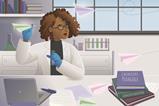Take part in chemistry-specific CPD to improve outcomes for your students (and yourself)
Well-planned, personalised professional development for teachers can have a positive impact on students. Educationalist Dylan Wiliam puts it this way: ‘Every teacher needs to improve, not because they are not good enough, but because they can be even better.’ Effective professional learning can help reduce the poverty-related attainment gap, improve teacher retention and boost student outcomes. However, the impact of continuing professional development (CPD) is heavily dependent on its quality and relevance to the development needs of the teacher.
Generic versus subject-specific CPD
- Generic CPD is professional learning that can be applicable to any teacher of any subject or at any stage. It can improve teachers’ pedagogical knowledge but is rarely contextualised for a specific subject area or part of a subject area.
Examples are: courses on leadership, behaviour management, metacognition, etc.
- Subject-specific CPD is professional learning that develops pedagogical content knowledge, such as the skills to teach a specific subject.
Examples are: looking at improving ways of teaching a specific part of a specific course or developing subject knowledge.
Generic CPD is professional learning that can be applicable to any teacher of any subject or stage. It can improve teachers’ pedagogical knowledge but is rarely contextualised for a specific subject area or part of a subject area. Examples are: a course on leadership, behaviour management, metacognition etc.
Subject-specific CPD is professional learning that develops pedagogical content knowledge, such as the skills to teach a specific subject. Examples are: looking at improving ways of teaching a specific part of a specific course or developing subject knowledge.
Generic CPD can be made more subject specific by giving teachers time to discuss how it’s relevant in their own context. For example, in a CPD session on retrieval practice, chemistry teachers might discuss how to use retrieval effectively to improve the learning of rates of reaction at National 5 or key stage 4, and to create a bank of questions to use. Allowing teachers to explore how to incorporate generic CPD into their own practice can empower teachers and increase their sense of agency.
The positive impact of subject-specific CPD
Schools need to address the attainment gap between pupils from more affluent and less affluent backgrounds – a major task. A report by the Sutton Trust asserts that being taught by a ‘very effective teacher’ significantly impacts pupils from disadvantaged backgrounds, so investing in CPD that will improve classroom practice is an effective way of addressing the attainment gap.
Teacher retention is another issue in schools, and research has shown that subject-specific professional learning can have a positive impact on keeping teachers in the classroom, and that this is applicable to teachers at all stages of their career. Wellcome’s Developing great subject knowledge report suggests that increased enthusiasm, motivation and job satisfaction improve retention.
Schools need to address the attainment gap between pupils from more affluent and less affluent backgrounds – a major task. A report by the Sutton Trust (bit.ly/3aujLxT) asserts that being taught by a ‘very effective teacher’ significantly impacts pupils from disadvantaged backgrounds, so investing in CPD that will improve classroom practice is an effective way of addressing the attainment gap.
Teacher retention is another issue in schools, and research has shown that subject-specific professional learning can have a positive impact on keeping teachers in the classroom, and that this is applicable to teachers at all stages of their career (bit.ly/3NTyjVz). Wellcome’s Developing great subject knowledge report (bit.ly/3yj0HdT) suggests that increased enthusiasm, motivation and job satisfaction improves retention.
There will always be a need for generic as well as subject-specific professional learning, but the balance needs to shift to an increased focus on the latter
When teachers are involved in putting together their own personalised CPD curriculum, this potentially has more impact on pupil outcomes than attending mandated all-staff CPD sessions. The Institute of Physics’ Subjects matter report states that ‘Teaching quality has been shown to be the single most important school-related factor in determining student outcomes (in terms of improved attainment and progression rates) and has a larger influence than, for example, class size or teacher salaries.’ So, it should be a priority to maximise teaching quality through effective CPD.
When teachers are involved in putting together their own personalised CPD curriculum, this potentially has more impact on pupil outcomes than attending mandated all-staff CPD sessions. The Institute of Physics Subjects’ matter report (bit.ly/3P70FfZ) states that ‘Teaching quality has been shown to be the single most important school-related factor in determining student outcomes (in terms of improved attainment and progression rates) and has a larger influence than, for example, class size or teacher salaries.’ So, it should be a priority to maximise teaching quality through effective CPD.
The Subjects matter report contains recommendations that would enhance the subject-specific professional learning available to teachers across the UK, such as funding a national system of subject-specific professional learning in each area and establishing that at least half of all the professional learning entitlement for teachers should be subject-specific.
Tailor it to the individual
The type of CPD teachers require could differ depending on their career stage. An early career teacher may have a greater need to develop subject knowledge than a more experienced teacher, and might benefit from subject-specific CPD in the form of coaching or mentoring from a more experienced colleague. And more experienced teachers may want CPD to further refine certain aspects of their practice.
Even teachers at the same stage of their careers will have different strengths and areas for development in their subject knowledge, and so it’s important CPD is tailored to the needs of the individual. Basically, we need to manage the learning needs of teachers similarly to those of pupils – by looking at the prior knowledge the teacher has and developing it.
Tailor it to the regional context
Regional, subject-specific CPD is also important because course content differs across the UK. For example, National 5 chemistry in Scotland contains different content to comparable chemistry courses in other parts of the UK, and key stage 3 science contains different content to Scotland’s Curriculum for Excellence level 3 science. This means that subject-specific CPD will differ depending on the region. A good example of this is the collaboration between Edinburgh Napier University and the Royal Society of Chemistry to deliver subject-specific CPD aimed at chemistry teachers in Scotland, to improve Scottish curriculum teaching and learning. The sessions have been extremely popular and the feedback from attendees has been overwhelmingly positive.
Regional, subject-specific CPD is also important because course content differs across the UK. For example, National 5 chemistry in Scotland contains different content to comparable chemistry courses in other parts of the UK, and key stage 3 science contains different content to Scotland’s Curriculum for Excellence level 3 science. This means that subject-specific CPD will differ depending on the region. A good example of this is the collaboration between Edinburgh Napier University and the Royal Society of Chemistry to deliver subject-specific CPD aimed at chemistry teachers in Scotland, to improve Scottish curriculum teaching and learning. The sessions have been extremely popular and the feedback from attendees has been overwhelmingly positive.
There will always be a need for generic as well as subject-specific professional learning, but the balance needs to shift to an increased focus on the latter. At its simplest, this can entail teachers discussing how generic professional learning can be applied in their own context. A more effective approach, however, is empowering teachers to identify the aspects of their teaching practice they would like to develop, and handing them control of their own professional learning so they can advance in those areas. Surely this is what will have the biggest impact on the teaching and learning in their own classroom.
Colin McGill is a lecturer in education on the PGDE programmes at Edinburgh Napier University















No comments yet